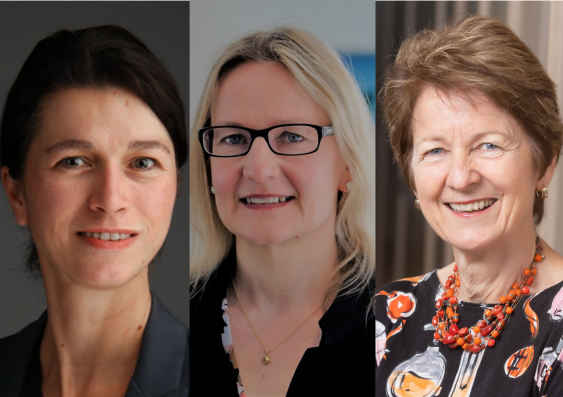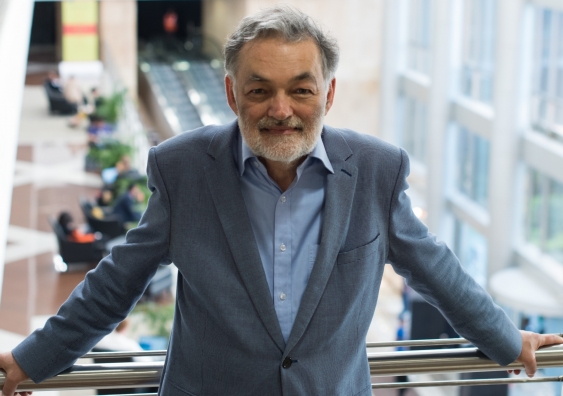The UNSW Sydney researchers are among 31 elected as Fellows, with each of them considered international leaders in their respective fields.
Five UNSW academics have been recognised for their significant and continuing research at the Australian Academy of Health and Medical Sciences’ (AAHMS) annual awards.
The new fellows from UNSW are Scientia Professor Justin Gooding from UNSW Science, Professor Deborah Lupton from UNSW Arts, Design & Architecture, Professor Raina MacIntyre from the Kirby Institute, Professor Kim Delbaere from NeuRA and Vice-Chancellor’s Fellow Professor Patricia Davidson.
UNSW Vice-Chancellor and President, Professor Attila Brungs congratulated the UNSW researchers elected Fellows of the AAHMS in 2024.
“We’re extremely proud of our five UNSW academics who have today been recognised by the current Fellows of the Australian Academy of Health and Medical Science. To be elected by their peers through a competitive process is a true honour,” Prof. Brungs said.
“They have not only shown outstanding leadership and mentorship in their fields, but also contributed to the understanding of medical science in the broader community and of course contributed to directly improving the health and wellbeing of Australians."
UNSW Deputy Vice-Chancellor, Research & Enterprise, Professor Bronwyn Fox said: “Congratulations to the five UNSW academics elected Fellows of the Academy. The breadth of their research includes surface chemistry, infectious diseases, healthy ageing, social research and cardiovascular health. We’re so very proud to have them in the UNSW community.”
Academy President Professor Louise Baur said: “Our new Fellows have a truly exceptional body of work, with each of them considered international leaders in their respective fields.”
“Our Fellowship represents the breadth and diversity of Australia’s health and medical expertise, allowing us to draw on independent, expert and evidence-based advice to drive change and improve health for all.”
Scientia Professor Justin Gooding FAA, FTSE, FAHMS
Prof. Gooding is an international leader in the field of surface chemistry, particularly the modification of surfaces for the development of better sensing devices. Â He has worked in several commercialisation projects that have turned research concepts into products that are sold worldwide.
Prof. Gooding is one of a small number of researchers who are members of all three STEM based learned academies: the Australian Academy of Science, the Australian Academy of Technological Sciences and Engineering and the Academy of Health and Medical Sciences.
On his achievement Prof. Gooding said: “It is very humbling and somewhat overwhelming. I feel it is testament to the ability of my team to do research that spans basic science to commercialising devices that provide tangible benefits to people and biomedical researchers.”
One of the commercialisation teams Prof. Gooding worked in produced a glucose biosensor for diabetes sold worldwide. He also co-designed a 3D printer that allows researchers to rapidly develop replicas of different types of cancer and their surrounding cells, which is expected to revolutionise cancer research.
Prof. Gooding’s current project is a smart patch being commercialised by a company in Melbourne with support from his team. The smart patch goes on a patient’s arm, allowing doctors to detect drug levels continuously and in real time, ensuring drug levels are right for the patient and not the average person. He describes it as “the most exciting, game changing technology that will come in our lifetime”.
Professor Deborah Lupton FASSA FRSN FAHMS
Prof. Lupton’s research is interdisciplinary, spanning public health, medical sociology, digital health, and communication studies. She is one of the top-most cited social researchers worldwide.
"Being elected to AAHMS is an absolute honour. I can't wait to learn about other Fellows' research and engage in collaborations for better health for all," Prof. Lupton said.
Prof. Lupton is Leader of the Vitalities Lab at UNSW, which works on understanding human experiences with digital and medical technologies. She is also working on several social research projects exploring Australians' experiences of the COVID-19 crisis.
She has advocated for the recognition of those with long COVID and contributed to research showing how the condition can be highly disabling, preventing them from engaging in study or paid work and harmful to relationships. Â
"My current research highlights the social and political aspects of the continuing COVID-19 pandemic and Long COVID, which is disabling millions of people worldwide. I am researching and advocating for better protections against COVID and other airborne hazards, including fighting for better clean air infrastructures and regulations."
Professor Raina MacIntyre FAHMS
Professor Raina MacIntyre has contributed a seminal body of research on vaccinology, face masks, respirators and transmission of respiratory pathogens, as well as epidemic response and emerging infectious diseases - including COVID-19.Â
"I am honoured to be named a Fellow of the AAHMS,” Prof. MacIntyre said. “The Academy plays a crucial role in advocating for key health and medical science issues that impact Australians. As part of this esteemed community, I am eager to contribute to advancing research on public health and emerging infectious diseases."Â
Professor MacIntyre heads up the at the Kirby Institute at UNSW, which conducts research in epidemiology, bioinformatics, health intelligence, vaccinology, bioterrorism prevention, mathematical modelling, genetic epidemiology, public health and clinical trials in infectious diseases. 
Her research falls under four areas: personal protective equipment, vaccinology, epidemic response and emerging infectious diseases, and bioterrorism prevention. She also conceived and developed , an advanced AI system for real-time global health intelligence.Â
Professor Kim Delbaere FAHMS
Throughout her career, Professor Kim Delbaere has made major contributions to identifying risk factors for falls and sub-optimal ageing. With a background in physiotherapy, she has dedicated her research to falls prevention, exercise interventions and the use of innovative health technology.
Her vision is to empower older Australians to understand and navigate better health trajectories through self-management. In addition to her research, she uses advocacy and commercialisation strategies to broaden the impact of her work.
“I am truly honoured to have been elected by my peers for this fellowship. My work has always been about translating research into real-world solutions that improve the lives of older adults,” Prof. Delbaere said.
“By working closely with consumers, healthcare professionals and policymakers, we are making evidence-based falls prevention strategies accessible and empowering older Australians to live more confidently and independently.”
Prof. Delbaere is Senior Principal Research Scientist at NeuRA and UNSW Medicine & Health, and Director of Innovation & Translation at NeuRA’s Falls, Balance & Injury Research Centre.
Professor Patricia Davidson FAHMSÂ
Prof. Patricia Davidson is a global leader in health service development and advocacy, focusing on person-centred care delivery and improving cardiovascular health outcomes for at-risk populations. She is a Vice-Chancellor's Fellow at UNSW.
“It is such an honour to be elected to Australia’s Learned Academy for health and medical sciences. I look forward to contributing to this interdisciplinary body in advancing the multifaceted health and medical issues faced by Australians,” Prof. Davidson said.
“Being recognised by such an illustrious body and my peers motivates me to advance science to improve the health outcomes of people living with chronic and complex conditions.”
Over four decades, Prof. Davidson’s clinical background and research initiatives have focused on improving the outcomes of individuals living with chronic and complex conditions.
Through multidisciplinary collaborations, she has developed and implemented interventions to limit disease progression (for cardiac rehabilitation, heart failure, delirium), promote self-management, and to facilitate symptom measurement (management of breathlessness, pain, anxiety and depression).
She has also implemented interventions to enable person-centred planning for treatment choices (advance care planning, shared decision making) and improving the quality of care.Â
Media enquiries
For enquiries about this story and interview requests please contact Yolande Hutchinson:
Tel: 0420 845 023
Email: y.hutchinson@unsw.edu.au











